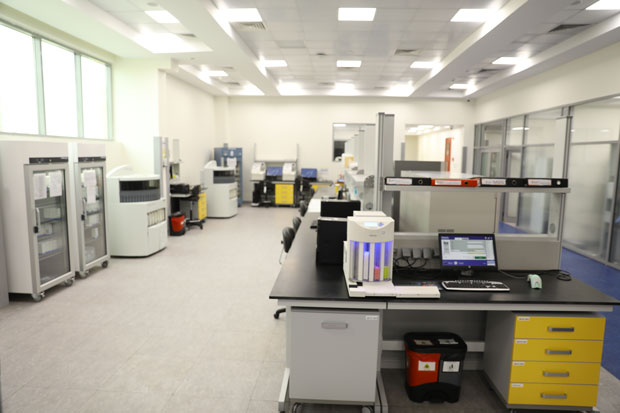RAS Plus Panel

RAS panel (KRAS + NRAS + BRAF)
- Clinical Implications
- Colorectal Cancer
- Recommendations for colorectal cancer by (NCCN)
- All individuals with metastatic colorectal cancer should have tumor tissue genotyped for RAS (KRAS and NRAS) and BRAF mutations.
- Individuals with any known KRAS mutation (exon 2, 3, 4) or NRAS mutation (exon 2, 3, 4) should not be treated with either cetuximab or panitumumab.
- BRAF V600E mutation makes response to cetuximab or panitumumab highly unlikely unless given with a BRAF inhibitor.
- Mutations in KRAS and NRAS are seen in approximately 52% of colorectal cancers, commonly involving codons 12, 13 and 61.
- KRAS and NRAS mutations are frequently encountered in approximately 44.7% and 7.5% of cases, respectively
- Test Description
- Test approach
- DNA was isolated and amplified by quantitative polymerase chain reaction (qPCR) using NRAS and KRAS CE-IVD kits according to manufacture protocol. Results interpreted according to the manufacture user guide.
- DNA was isolated and amplified by quantitative polymerase chain reaction (qPCR) using BRAF V600E, D, R and K CE-IVD kit. according to manufacture protocol. Results interpreted according to the manufacture user guide.
- Reporting name
- Test prerequisites (To ensure timely results)
- Patient’s demographic data.
- Clinicopathologic information:
- Pathology report (final or preliminary) including anatomic location.
- History of any given therapy for cancer and its date and relation to sample sent for molecular study (i.e. pre & post therapy). Therapy includes chemo and radiotherapy, hormonal or targeted therapy.
- Any other relevant clinical data or history.
- Type of sample:
- Preferred: Formalin-fixed, paraffin-embedded (FFPE) tumor tissue block or cell block.
- Acceptable:
- Section in Eppendorf: Up to 4 sections, each with a thickness of up to 10 μm and a surface area of up to 250 mm2 + good H&E slide for assessment.
- Five unstained slides + one good H&E slide.
- Specimen Minimum Volume: Two 10-micron sections of FFPE.
- Quality Control measures
- From your side:
- Double check you are fulfilling all required data before sending your sample.
- Check that your pathologist has selected the best block in terms of tumor cellularity, with least presence of necrosis and inflammation.
- Pretherapy sample is preferred (if underwent any cancer therapy).
- In our lab:
- Assessment of tissue for adequacy & tumor cellularity before any molecular analysis.
- Matching block ID with the report ID and demographic data.
- Matching the submitted block with the data reported in the pathology report.
- N.B.
- If the sample sent in Eppendorf, it is your pathology lab’s responsibility to ensure the sample in Eppendorf is corresponding to the submitted H&E slide (we can’t prepare slide from Eppendorf).
- This test does not include a pathology consultation.
- Test Time
- Retention of the sample
- Selected References
- Lindeman NI et al: Updated molecular testing guideline for the selection of lung cancer patients for treatment with targeted tyrosine kinase inhibitors: guideline from the College of American Pathologists, the International Association for the Study of Lung Cancer, and the Association for Molecular Pathology. J Mol Diagn. 20(2):129-59, 2018
- Wiesweg M et al: Impact of RAS mutation subtype on clinical outcome-a cross-entity comparison of patients with advanced non-small cell lung cancer and colorectal cancer. Oncogene. ePub, 2018
- Tímár J: The clinical relevance of KRAS of gene mutation in non-small-cell lung cancer. Curr Opin Oncol. 26(2):138-44, 2014
- di Magliano MP et al: Roles for KRAS in pancreatic tumor development and progression. Gastroenterology. 144(6):1220-9, 2013
- Plowman SJ et al: K-ras 4A and 4B are co-expressed widely in human tissues, and their ratio is altered in sporadic colorectal cancer. J Exp Clin Cancer Res. 25(2):259-67, 2006
- Tannapfel A et al: Frequency of p16(INK4A) alterations and K-ras mutations in intrahepatic cholangiocarcinoma of the liver. Gut. 47(5):721-7, 2000
- Cox, Adrienne D et al. “Drugging the undruggable RAS: Mission possible?.” Nature reviews. Drug discovery vol. 13,1: 828-51, (2014).
- Sepulveda, A. R., et al. “Biomarkers for the evaluation of colorectal cancer: guideline summary from the American Society for Clinical Pathology, College of American Pathologists, Association for Molecular Pathology, and American Society of Clinical Oncology.” J Clin Oncol 35: 1453-86, 2017.
- Van Krieken, J. Han JM, et al. “RAS testing in metastatic colorectal cancer: advances in Europe.” Virchows Archiv 468.4: 383-396, 2016
Real-Time Polymerase Chain Reaction (qPCR).
RAS Plus Panel
All samples are subject to stringent quality control measures that include:
From 3 days to 5 working days.
Client provided paraffin blocks, Whole Blood EDTA and unstained slides (if provided) will be returned after testing is complete.